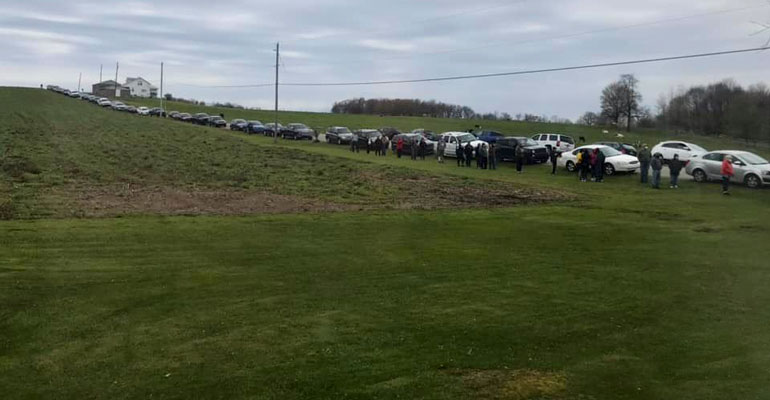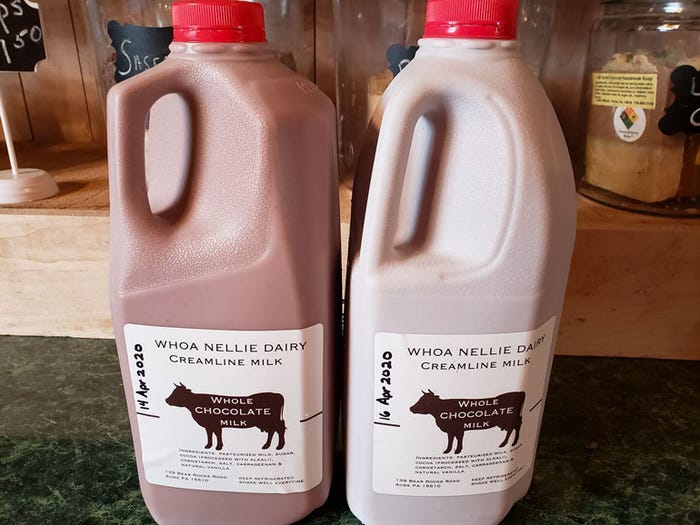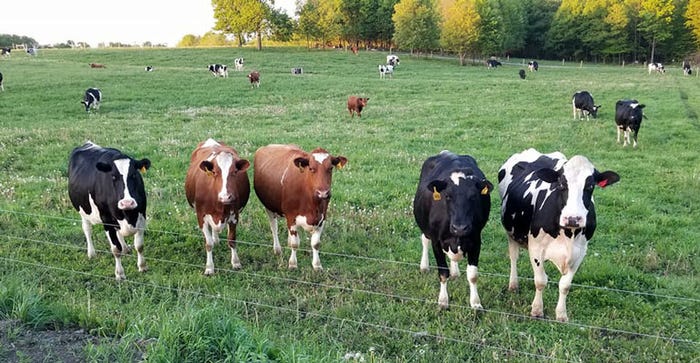
May 4 was the day that the Brown family of Acme, Pa., got the news every dairy farmer dreads: They were being dropped by their milk processor.
Mary Beth Brown says she saw it coming. When schools and institutions closed as a result of COVID-19, milk that once had a secure home was instead being dumped. She herself saw her processor, Schneider’s Dairy, talk about having to ask farmers to dump milk on the evening news one night.
“Our personal views … it’s disgusting to waste the food,” she says.
Instead of dumping it, they decided to bottle it themselves. They worked “around the clock” to bottle as much as they could and sent the word out on Facebook about what they were doing.
Their followers responded, and lines of cars and trucks came out to the farm, Whoa Nellie Dairy, to get their cream-line milk, which the farm has long been known for.
“That just kind of exploded,” she says. “A lot of people were angry about it because it’s silly to waste the food.”
Then, May 4 came. The Browns got word that they were being dropped. It meant that 60% of their milk needed a permanent new home.
Luckily for the Browns, with a little bit of hard work and luck they’ve been able to weather the COVID-19 storm, for now.
Changes in the works
The Browns have long wanted to direct-market their milk.
Mary Beth and husband Ben Brown took over the farm — which has been in Ben’s family since the late 1700s — from his parents in 2016. At the time they shipped milk to Dairy Farmers of America.
Unhappy with the price they were getting from their cooperative, they decided to investigate bottling their own milk. They purchased a 30-gallon milk pasteurization system and opened a farm store.
They milk 65 cows and raise Black Angus cattle and some youngstock for a total of around 200 head. They also have three children ages 9, 8 and 7.
A little luck
The 30-gallon pasteurizer was just large enough for them to bottle 40% of their milk. But the Browns were already planning to upgrade their pasteurizer.
In January, they bought a 45-gallon pasteurizer. Luckily for them, it arrived in late April just in time for bottling lots of extra milk.
 CREAMY DELIGHT: Whoa Nellie Dairy is known for its low-temperature pasteurization, which preserves the cream in their milk.
CREAMY DELIGHT: Whoa Nellie Dairy is known for its low-temperature pasteurization, which preserves the cream in their milk.

Mary Beth says that she and her husband, one full-time employee and two part-timers are still working around the clock, seven days a week to pasteurize and bottle all their milk. The hard work has paid off. They’ve sold out of their milk numerous times, and people keep flocking to the farm store for more.
Visitors from as far as Ohio and Hershey, Pa., four hours away, have visited the farm.
The Browns have already planned for the next upgrade. They’ve ordered a 100-gallon vat, which they hope to get this fall.
Worth the stress
The around-the-clock milking schedule has been grueling.
“It’s a lot of stress on the equipment, a lot of stress on people,” Mary Beth says. “But once the 100-gallon vat goes through, we can go back to normal.”
Mary Beth and Ben bottle the milk and milk the cows while their oldest child takes care of the calves. Ben’s mother also helps bottle while two part-time workers handle things in the farm store. Ben’s father helps with planting and field work on 500 acres.
The schedule is especially grueling for Mary Beth. Two-and-a-half years ago, she was diagnosed with stage 4 metastatic breast cancer. It has spread to her bones and the lining in her brain. Doctors gave her five years to live when she was first diagnosed, but she says the cancer has stopped spreading.
Even so, her doctors have told her to get as much rest and sleep as she can for her body to fight off the disease. Still, she’s happy to be working hard and helping out.
“We are still getting lines. We still have people coming an hour before we open,” she says. “The past month has been stunning to us. We're still stunned. We’re in awe of everything. It's really fun right now.”
‘Think outside the box’
For other farmers thinking of doing their own direct marketing, Mary Beth says to think of ways to maximize the land to your advantage.
Along with the milk bottling, she and her husband have started a corn maze and other fall agritainment activities.
 MORE GREEN FEED: The cows at Whoa Nellie Dairy spend most of their spring and summer on pasture, which the Browns say enhances the taste of their milk.
MORE GREEN FEED: The cows at Whoa Nellie Dairy spend most of their spring and summer on pasture, which the Browns say enhances the taste of their milk.

While they had to shell out thousands of dollars for their pasteurizer, Mary Beth says the management of the cows hasn’t changed much; the only exception being that the cows now pasture for most of the spring and summer.
“You got to think of other ways because the milk companies are unreliable and the government is unreliable,” she says.
Read more about:
Covid 19About the Author(s)
You May Also Like






